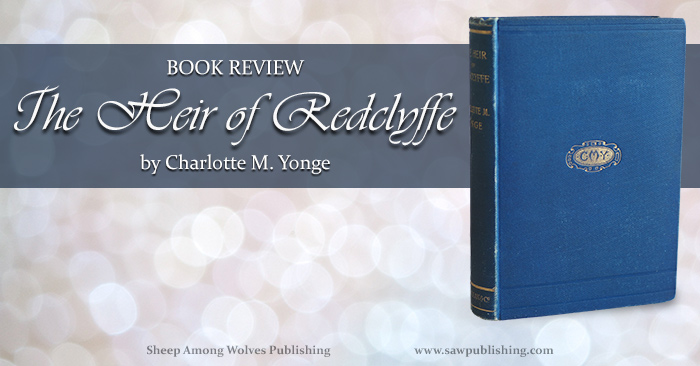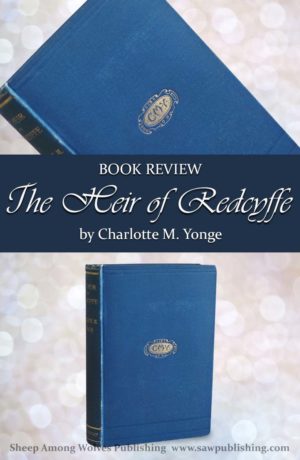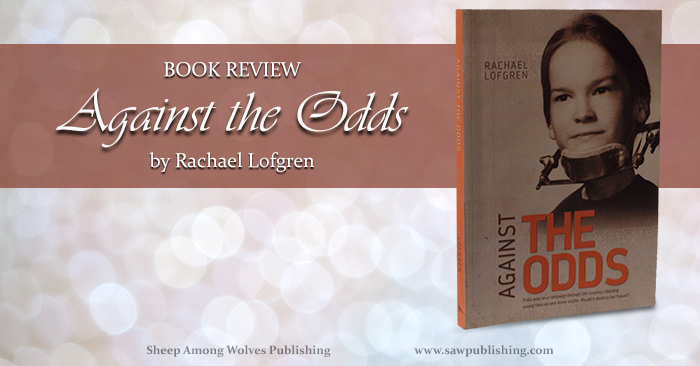The Heir of Redclyffe—Book Review
 Can you think of a book that has changed your life? One that has forever altered the perspective you have on this world and the next? Maybe you can think of more than one book. I certainly can.
Can you think of a book that has changed your life? One that has forever altered the perspective you have on this world and the next? Maybe you can think of more than one book. I certainly can.
But when I sit down and try to name the book which has had the most profound and lasting impact on my life—outside of the Book of books—I have to think of The Heir of Redclyffe. But it’s almost hard to know where to begin in talking about it, because it has changed me in so many ways and formed my opinions of so many things.
Through it I learned a higher standard of heroism and choosing God’s way no matter what the cost. It taught me lessons about forgiveness, repentance and humility. It solidified my picture of what true, God-honouring romance really is, and the sacredness of one frail human type of the Great Bridegroom and His Bride.
In fact, it taught me the lesson that the ordinary and commonplace of this world can be forever glorified and uplifted by being coloured by the truth, the power and the love of God.
In many ways, I would hardly be the person, or the author, I am today, without what—in my opinion—just might be the greatest and most powerful of English novels ever written.
One thing I love about a truly exceptional book, is the wealth of material it contains—the way you can read it over and over again and still find something new. This time I read it, the “something new” was the importance of little choices. As you read the story watch how the little things—seemingly insignificant at the time—can give colouring to a character’s entire life and storyline.
 Book Details
Book Details
- Title: The Heir of Redclyffe
- Author: Charlotte Mary Yonge
- Publisher: Macmillan and Co.
- Genre: Victorian Christian Fiction
- Number of Pages: 539
- Theme: Repentance, forgiveness and the power of God
- Age Range: Youth and Adult
- Source: Project Gutenberg
Summary
The history of the Morville family is fraught with bitterness and evil—sins that have resulted in much ruin and sorrow, and an almost total breach between the elder and younger branches of the family. When the present baronet dies a broken but repentant man, he leaves his young grandson heir to his vast estates—and perhaps his ancestral temptations as well. Guy is a promising youth, full of spirit and life, an earnest desire to do right and a pure, high-minded chivalry and romance. But will his noble qualities be enough security against repeating the errors of his ancestors? Or will it take a Higher Power to heal the breach and overcome his doom?
The Heir of Redclyffe is arguably my favourite book of all-time—“arguably,” only because I love so many books! I have honestly never met with an author who draws more vivid true-to-life characters—and that’s including many of the most famous classics! Charlotte Yonge is a master of character development, and an equal master at bringing out the true nobility and beauty of single-minded devotion to Christ. While the story does deal with themes such as anger and ancestral sin, the overall tone is one of the triumph of truth and godliness.
SAW Rating System
We have recently altered our reviewing system using the model of our poetry grading worksheet. For an explanation of the new system, system see our introductory post.
Total Score—90/100
Great Qualities—46/50
Plot development—8/10
Character development—10/10
Command of language—9/10
Impact of the book—10/10
Originality—9/10
Good Qualities—43/50
Innocence regarding evil—7/10
Active promotion of good—10/10
Level of spiritual challenge—10/10
Healthy view of life—8/10
Honouring God—9/10
Items of Note
-
Romance and morality
A runaway marriage is part of the backstory to the plot, as well as an ancestor who married a lady in love with someone else and had her first love executed. Neither of these are in any way condoned.
Two instances of concealed engagements occur (one nearly ending in elopement). These pose as a foil to the godly romance of the story, which is portrayed as very pure, God-focused and uplifting.
Being alone and a certain level of physical contact (holding hands, a kiss on the forehead) is seen as acceptable after engagement. The feelings of the characters are portrayed in moderation.
There is some flirting and teasing about romantic interest, but the godly characters dislike both these things.
-
Disturbing content
The setup to the story includes a history of ancestral sin and crime, which is detailed or alluded to in numerous places. These crimes and their consequences are for the most part not overly gratuitous but are intended to be somewhat disturbing as showing the appalling nature of sin. Sensitive readers might be bothered by some of these.
Some details of a deadly feud in Scottish history are mentioned including someone cutting off his enemy’s head and putting it on the table at breakfast with a piece of bread in his mouth.
-
Language
A number of words/phrases have changed meaning since the author’s day, including, “gay”, “fag” and “knocked up”.
The word “vow” is used to express a strong resolution rather than a binding commitment.
The word fool is used a little more than I would quite like, as well as phrases like “thank heaven”, “heaven forbid”, “would to heaven”. However, the author is very careful in her use of God’s Name—even in a directly religious context—so I find it hard to believe that she is intending any carelessness in these phrases. In one place “thank God” is said in very genuine gratitude.
Some milder exclamations such as “mercy” and “law” are also present throughout the story.
There are some quotations of other languages/dialects—while I assume that these are innocent, I cannot say for certain.
Swearing is referenced but no actual words recorded.
References to “the fates” and specific Greek deities appear to be simply the result of classical education and are not a reflection on the author’s religious views.
-
Alcohol and drug use (includes tobacco)
Alcohol abuse is mentioned and portrayed as negative. A disreputable character’s house is described as having a “perfume of brandy and cigars.”
Moderate alcohol consumption and cigar-smoking are seen as acceptable. However, horror is expressed at the thought of a lady smoking.
Opium is used as a medicine.
-
Spiritual content
This book is written from a High Anglican perspective. This outlook comes out in such doctrinal areas as infant baptism and other Anglican viewpoints. However, the book is highly accessible to a wide range of denominations.
Ghosts, pixies and fairies are mentioned in various places. While no definitive conclusions are drawn about ghosts, they are really only used as a transition to introduce a character’s strong feelings about his ancestors’ crimes.
A reference to Joan of Arc’s visions seems to imply that the author believes in them.
Evil spirits, demons, angels etc. are used somewhat figuratively to speak of the struggle between good and evil in a person’s heart. This struggle between good and evil is portrayed quite vividly throughout the story with a definite sense of the ultimate triumph of good.
The theme of an “ancestral doom,” and the concept of the sin of the fathers being visited on the children, plays a significant role in the story, although the author’s conclusions are quite good.
There are many quotations and allusions to literature throughout the story, some of which appear to be far from “innocent regarding evil.”
-
Family roles and behavior
A father is portrayed as a weak man who is easily swayed by whoever is influencing him. This is not the author’s standard portrayal of fatherhood and is seen as weakness in him. In consequence of this, others in the family do not display proper respect for him, but these attitudes are portrayed as wrong and improve over the course of the book.
In a couple of places truth is stretched or compromised by a character, and the subject is not really addressed. However, the author’s stance on truth overall is very high.
There is a greater level of embracing and kissing between grown-up siblings and more distant relations than is normal today.
-
Mature subject matter
Gambling and betting are addressed and portrayed as wrong.
Additional Notes
Many of the negative contents or themes listed above form the wrong side of a struggle with good and evil. This struggle is portrayed from a very godly perspective, and the overall tone of the book is uplifting and spiritually positive.
The Heir of Redclyffe—A Book Well Worth the Effort
I first read The Heir of Redclyffe when I was not quite sixteen. In some ways, I was maybe a bit on the young side for it then, but in others I really appreciate the fact that it was able thereby to form many of my views and ideas—views and ideas that I will take with me for the rest of my life.
I do realize that Redclyffe may be a stretch for those not accustomed to the language, style and length of a book like this. But in my opinion, it’s well worth the effort. Reading through the first chapters for the first time may take some commitment. The narrative jumps right into the story and it does take a while to sort out characters and events and realize who we are even talking about.
But—
If you keep on reading, I think I can guarantee that you will be entranced by page 100 and angry by page 220 and in tears by page 415, and that when you finish the book, you’ll be a fan for life. Because, in my opinion, it’s just that good.
Looking for other books to add to your to-be-read list? See our review of Against the Odds:
Provide the next place to go on your site. (If possible, tie the two together.)

